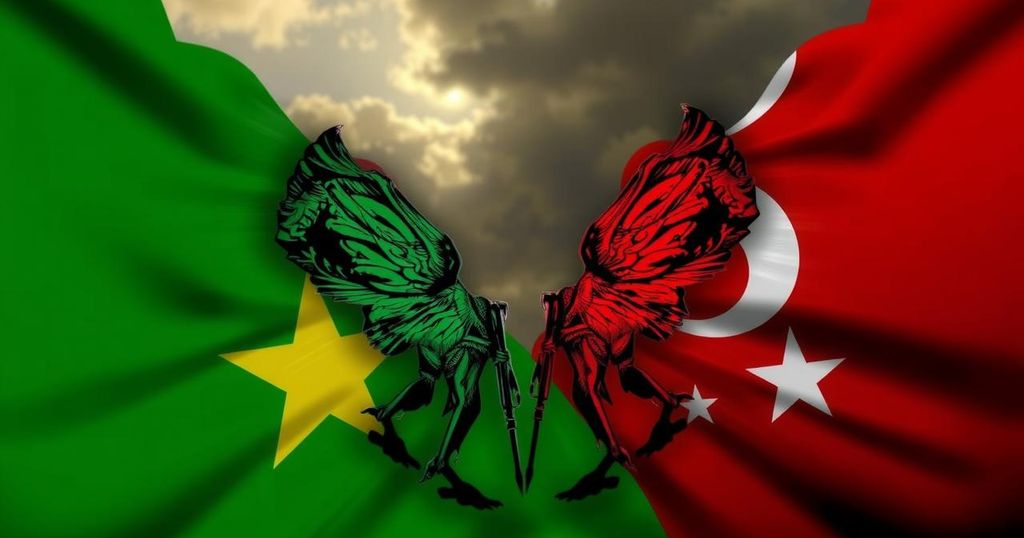Global news
ABD, AFRICA, ASMARA, BEJA CONGRESS, CIVIL WAR, CONFLICT RESOLUTION, DIPLOMACY, EL BURHAN, EL GEDAREF, EL LAFA, ERITREA, INTERNATIONAL CONFERENCE, ISA, ISAIAS AFWERKI, KASSALA, KHALED MOHAMED TAHA, PEACEKEEPING, RED SEA, REGIONAL SECURITY, S SOVEREIGNTY COUNCIL, SAF, SUDAN, SUDANESE ARMED FORCES, UNITED POPULAR FRONT FOR LIBERATION AND JUSTICE
Jamal Walker
0 Comments
Sudan-Eritrea Military Alliance: A Catalyst for Tribal Conflict?
The recent military collaboration between Sudan and Eritrea led by Lt Gen Abdelfattah El Burhan raises alarm over the escalation of tribal conflicts in eastern Sudan, where multiple armed factions are aligning with Sudanese forces. The visit included discussions on security, military cooperation, and economic ties, emphasizing regional stability yet risking deeper tribal militarization and conflict.
A recent visit by Lt Gen Abdelfattah El Burhan, head of Sudan’s Sovereignty Council and Commander-in-chief of the Sudanese Armed Forces (SAF), to Eritrea’s capital, Asmara, has ignited concerns regarding a potential increase in tribal conflict amid ongoing turmoil in Sudan. Accompanied by members of his cabinet, El Burhan engaged in discussions with Eritrean President Isaias Afwerki, which primarily centered around strengthening military cooperation, enhancing economic ties, and ensuring regional stability.
During the meeting, President Afwerki emphasized the importance of Sudan’s sovereignty, stating that the resolution of the ongoing crisis should be undertaken by Sudan’s own people, albeit with some regional support. This aligns with a broader strategy to maintain Sudan’s unity and stability, which are seen as critical for the surrounding regions. El Burhan, in turn, expressed appreciation for Eritrea’s support during Sudan’s conflicts and articulated a desire for deepened bilateral relations.
Analysts suggest that El Burhan’s visit aimed at fostering Eritrea as a principal ally to Sudanese forces while addressing the complexities related to various armed factions operating within Eritrea, particularly those in its western region. Eritrea is currently hosting training camps for eastern Sudanese armed groups, which complicates the dynamics of Sudan’s internal conflict and the relationships among various tribes.
In addition, the economic aspect of their discussions included plans to revitalize border crossings, with significant progress reported on the Kassala-El Lafa highway that aims to enhance trade between the two nations. Eritrea’s commitment to maintaining regional stability comes with a readiness to intervene should the situation in Sudan spill over into eastern regions such as Kassala, El Gedaref, or the Red Sea.
The tensions in eastern Sudan have become increasingly pronounced as various armed factions perceive opportunities for alignment with the SAF. Reports indicate that groups like Amin Daoud’s Eastern Battalion, which were previously neutral, have begun to coordinate operations with the SAF, raising alarms about the potential for widespread tribal conflict. Analysts caution that the intersection of militarization and tribal allegiances could lead to a significant shift in the conflict’s nature, transforming it into a deeper tribal war influenced by external factions.
This emerging alliance between Sudan and Eritrea, marked by military coordination and heightened border security, appears to be a double-edged sword, as it risks deepening the divisions within eastern Sudan and may catalyze a surge in tribal violence. The strategic importance of eastern Sudan, particularly due to its valuable resources and proximity to essential Red Sea ports, heightens the stakes for regional stability.
The current geopolitical landscape necessitates careful monitoring as the implications of Sudan’s collaboration with Eritrea unfold, potentially transforming the conflict landscape into one defined by complexity and intensified tribal rivalries.
The intricate relationship between Sudan and Eritrea has been underscored by political and military developments in the region. Sudan, facing internal strife, has sought to strengthen its military alliances while ensuring security along its borders. Eritrea, on the other hand, has hosted various armed groups that originate from eastern Sudan, which has complicated the regional security dynamics. Recent discussions between Sudanese and Eritrean leaders reveal an intention to foster cooperation, yet also highlight the potential for heightened conflict among tribal factions, rooted in the militarization of the area and ongoing political instability.
In summary, the military alliance between Sudan and Eritrea poses significant risks of exacerbating tribal tensions within eastern Sudan. As Sudan seeks to strengthen military and economic ties with Eritrea, the involvement of various armed factions adds complexity to an already volatile situation. The potential for a broader tribal conflict looms, calling for vigilant observation and intervention strategies to mitigate such escalations in the region.
Original Source: www.dabangasudan.org




Post Comment